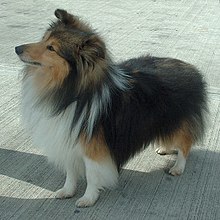Shetland Sheepdog

Sable/White Shetland Sheepdog
|
|||||||||||||||||||||||||||||||||
| Other names | Shetland Collie (obsolete) Dwarf Scotch Shepherd (obsolete) Toonie dog (obsolete) |
||||||||||||||||||||||||||||||||
|---|---|---|---|---|---|---|---|---|---|---|---|---|---|---|---|---|---|---|---|---|---|---|---|---|---|---|---|---|---|---|---|---|---|
| Common nicknames | Sheltie | ||||||||||||||||||||||||||||||||
| Origin | Scotland | ||||||||||||||||||||||||||||||||
|
|||||||||||||||||||||||||||||||||
|
|||||||||||||||||||||||||||||||||
| Domestic dog (Canis lupus familiaris) | |||||||||||||||||||||||||||||||||
| Traits | |||
|---|---|---|---|
| Weight | Male | 5.0–10.9 kg (11–24 lb) | |
| Female | 5.0–10.9 kg (11–24 lb) | ||
| Height | Male | 33–41 cm (13–16 in) | |
| Female | 33–41 cm (13–16 in) | ||
| Coat | long double coat | ||
| Color | sable, mahogany sable, shaded sable, tri-colored, bi-black, bi-blue, blue merle, bi-blue merle, sable merle, color headed white, double merle |
||
| Litter size | 4-6 puppies | ||
| Life span | 12-13 years (average) | ||
| Classification / standards | |||
|---|---|---|---|
| FCI | Group 1, Section 1 Sheepdogs #88 | standard | |
| AKC | Herding | standard | |
| ANKC | Group 5 (Working Dogs) | standard | |
| CKC | Group 7 (Herding) | standard | |
| KC (UK) | Pastoral | standard | |
| NZKC | Working | standard | |
| UKC | Herding | standard | |
The Shetland Sheepdog, also known as the Sheltie, is a breed of herding dog. The original name of this breed was Shetland Collie, but this caused controversy among the Rough Collie breeders at the time, so the breed's name was formally changed to Shetland Sheepdog. This small dog is intelligent, vocal, excitable, energetic and willing to please and work hard. The breed was formally recognized by The Kennel Club in 1909.
The Shetland Sheepdog's early history is not well known. Although of obscure origin, what is known is that the Sheltie is a direct descendant of the Collie. The Sheltie is a descendant of small specimens of the Scottish Collie and the King Charles Spaniel. It was developed to tend the diminutive sheep of the Shetland Islands, whose rugged, stormy shores have produced other small-statured animals such as the Shetland pony. Today it is raised as a farm dog and family pet. They were originally a small mixed-breed dog, often only about 8 inches to 12 inches in height at the shoulder, and it is thought that the original Shetland herding dogs were of the Spitz type, and were crossed with Collies from mainland Britain. In the early 20th century, James Loggie added a small Rough Collie to the breeding stock, and helped establish what would become the modern Shetland sheepdog.
Unlike many miniature breeds that resemble their larger counterparts, this breed was not developed simply by selectively breeding the Rough Collie for smaller and smaller size. The original sheepdog of Shetland was a Spitz-type dog, probably similar to the modern Icelandic Sheepdog. This dog was crossed with mainland working collies brought to the islands, and then after being brought to England, it was further extensively crossed with the Rough Collie, and other breeds including some or all of the extinct Greenland Yakki, the King Charles Spaniel (not the Cavalier), the Pomeranian, and possibly the Border Collie. The original Spitz-type working sheepdog of Shetland is now extinct, having been replaced for herding there by the Border Collie. The Shetland Sheepdog in its modern form has never been used as a working dog on Shetland, and ironically it is uncommon there.
...
Wikipedia
